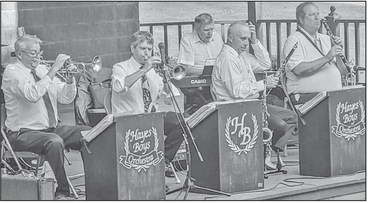Board to vote on $6 septic fee
A proposed $6 annual fee for maintaining private septic systems, which is expected to generate $125,240 per year from county residents who live in rural towns, will be voted on by the Marathon County Board of Supervisors later this month.
The recommendation from the Environmental Resources Committee is part of a larger move to transfer the cost of providing county services from the property tax levy to user fees paid directly by those who benefit from those services. When members of the ERC were debating the fee at their Sept. 2 meeting, county administrator Lance Leonhard told supervisors to expect more of the same as part of the 2026 budget-building process.
“We’re having exceedingly painful conversations with every department about increasing fees,” he said. “If you think this is unreasonable, a $6 fee, you’re not going to like the fee schedule I present to you, because it’s going to have a lot more increases in fees.” Leonhard said the ability to raise property taxes, which is limited by the amount of net new construction within the county, is simply not keeping up with the cost of providing services, so county officials are looking at raising fees by an average of 7.5 percent as an alternative.
Supervisor Chris Dickinson, however, wanted to know if the conversations about increasing fees across are being held in conjunction with talks about “cutting staff to balance that.”
“Because you just can’t continue to go up in cost and maintain a certain amount of staffing,” he said. “I don’t hear that conversation in any committee or the board.”
Leonhard said Dickinson is “absolutely correct,” noting that eight to 10 open positions across various departments would be eliminated next year as part of his budget proposal, with the goal of minimizing impacts on service levels.
“I think you can make an argument that we’re going to impact service level, but yeah, we’re going to not fund a number of positions,” he said.
Still, Dickinson said the process of having committees decide which areas of the budget to cut is “not working,” arguing that it should really be up to the department heads and administrator to come up with those recommendations.
“The committees don’t have enough relevant information to really make that decision,” he said.
Dickinson, who clarified that he is not asking for “hacking” county positions or firing people, said the county board’s job is really to decide on policies, approve the budget and oversee county administration.
Supervisor John Robinson said the simple fact is that the county cannot continue to offer the services it provides with a 1.61 percent increase in its tax levy (based on this year’s net new construction). The rate of inflation is way beyond that, he said.
“You’re faced with the tough decisions of where do you come up with funding or make cuts,” he said, noting that the budget process has been changed in recent years to provide more opportunities for the standing committees to engage in budget conversations early on and make recommendations based on their areas of oversight.
“All input is welcome, but we can’t live off the increases of 1.61 percent in the levy,” he said.
When it comes to the $6 fee for maintenance of private onsite waste treatment systems (POWTS), a couple of the rural representatives from the west side of the county were the most vocal opponents on the ERC.
Marilyn Bhend, a non-voting member of the committee from the town of Johnson, said the cost of a new holding tank is between $12,000 and $15,000, and a mound system can cost as much as $35,000. The county also charges between $500 and $650 for newly installed POWTS, and waste haulers charge between $150 and $40 for inspections, she noted.
“I represent towns, and I say no,” she said.
Supervisor Allen Drabek, who represents the towns of Frankfort, Johnson, Rietbrock and Wien, asked if the $6 fee would result in a drop in property taxes. Leonhard said no.
Drabek said rural residents are unable to pass the cost of fees onto others, and according to a recent ALICE (Asset-Limited, Income-Constrained, Employed) report on household incomes, people in rural Marathon County “aren’t making it.”
“Where are they supposed to come up with the money then?” he said. “They’re at the end of the line. What do they do?”
Drabek was the only committee member to vote against motions to amend Chapter 15 of the county’s code of ordinances, which deals with private waste systems, and to set the fee at $6 contingent on the board’s approval of the amendments.
Shad Harvey, land information manager for Conservation, Planning and Zoning, said three rural townships responded to a request for comment on the new fee, with the towns of Hull and Knowlton expressing opposition and the town of Day raising several questions and concerns.
According to information presented by Harvey, 31 of Wisconsin’s 72 counties already have a fee in place to cover the cost of their POWTS maintenance program, which is mandated by the state. The average fee charged by those counties is $8 per year.
If the $6 fee is adopted by the board as part of the Chapter 15 amendments, the revenue generated by the fee is expected to fully remove the cost of the POWTS maintenance program from the tax levy, which includes $125,140 for staff time, postage, software and other costs. A total of 21,219 POWTS are currently enrolled in the maintenance program, with an average of 157 new systems being added every year over the past five years, according to CPZ.
Leachate agreement
Dave Hagenbucher, director of the Solid Waste Department, spoke to the committee about a proposal to build a reverse osmosis treatment facility at the county landfill to address the problem of so-called “forever chemicals” that leach out of the waste stream and collect at the bottom of the landfill.
The county plans to apply for loans and grants through the Wisconsin DNR’s Clean Water Fund to cover the estimated $12 million cost of the facility, which would also handle PFAS leachate from Shawano and Portage counties.
In order to ensure that the other two counties pay their fair share of the upfront and long-term costs of handling the leachate, Marathon County is looking at either revisiting its current waste-handling contract or creating a new joint venture agreement that would create a new governing board.
Corporation counsel Michael Puerner said he believes the existing agreement with Portage and Shawano counties could be read in such a way that obligates those two counties to help pay for the leachate, though he can’t guarantee what a judge might decide if it came before a court.
Hagenbucher explained to the committee that the reverse osmosis system would concentrate the PFAS within the landfill and recirculate them to the top of the garbage heap so it’s not as likely to leach into the ground. Technologies to completely remove PFAS from the waste are just not ready for implementation, he said.
“This is a solution we have now,” he said.
ERC members agreed that county officials should talk with the other two counties about the best way to pay for the leachate system.
“We should not be asked to foot the bill for these other two counties,” said chairman Mike Ritter.
Comp plan updates
The committee voted to send draft revisions of Chapter 17 of the comprehensive plan, which deals with zoning codes, to the county’s townships for review. Harvey first addressed some previous questions about battery energy storage systems (BESS) and tourist rooms.
For BESS units, he said owners are required to follow National Fire Protection Association standards for handling spills, and with tourist rooms, he said the owners need to obtain a license through the Health Department and may also need to follow ordinances set by towns.
When it comes to updating the comp plan, Harvey said the plan is to have an open house for the towns to attend in September or October, followed by further revisions in November and possible adoption by the board in December.



